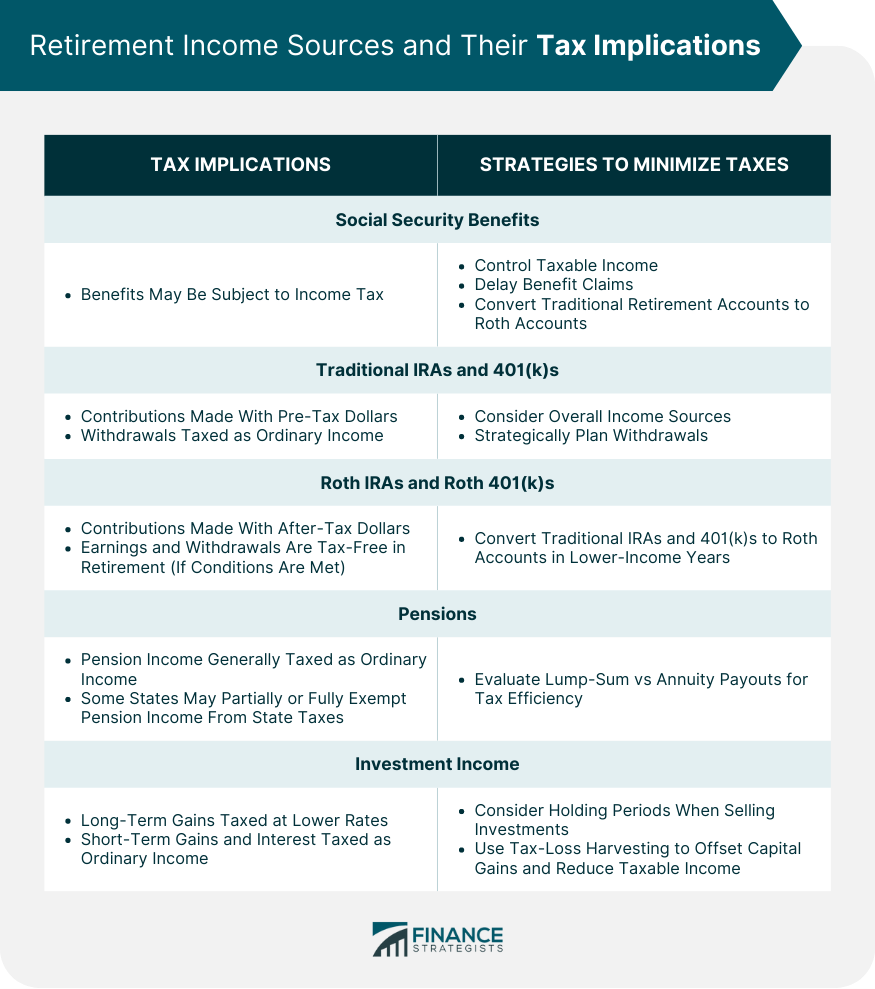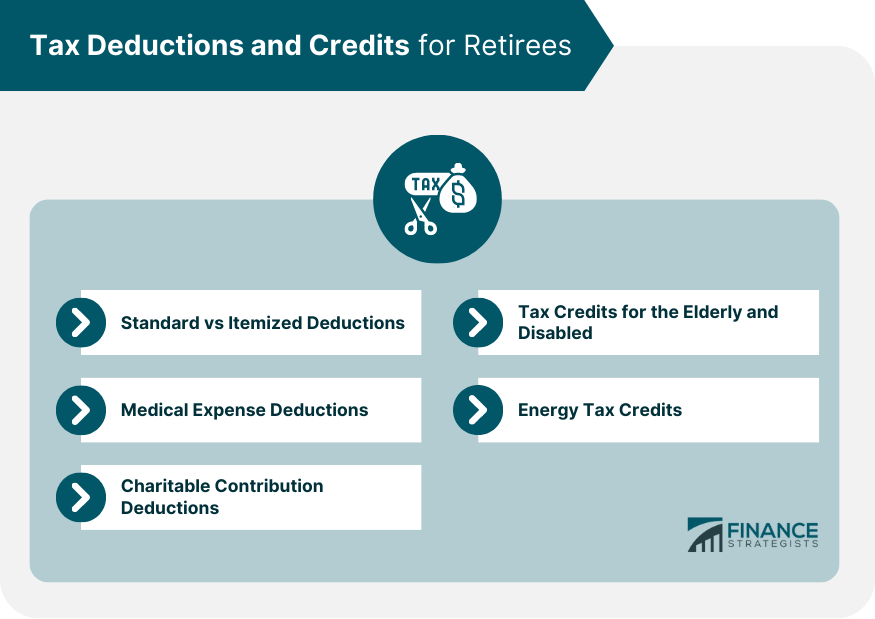Tax planning for retirement involves strategically managing income, deductions, and credits to minimize taxes during retirement years. This process helps retirees maximize their income and savings while staying compliant with tax laws. Effective tax planning is crucial for financial security in retirement, as it can significantly impact the amount of income available to cover living expenses. By minimizing tax liabilities, retirees can preserve more of their hard-earned money and maintain a comfortable lifestyle. Successful tax planning requires understanding various income sources, tax implications, available deductions and credits, and estate planning considerations. Additionally, working with a tax professional can provide personalized guidance and help avoid costly mistakes. Up to 85% of Social Security benefits may be taxable, depending on a retiree's total income and filing status. To minimize taxes on these benefits, retirees must be aware of the income thresholds and strategically plan their other income sources. Retirees can minimize taxes on Social Security benefits by controlling their taxable income, delaying benefit claims, or converting traditional retirement accounts to Roth accounts. These strategies help reduce the proportion of benefits subject to taxation. Traditional IRAs and 401(k)s offer tax-deferred growth, meaning that contributions are made with pre-tax dollars, and taxes are deferred until withdrawals are made in retirement. This allows for potential investment growth without the immediate burden of taxes. Starting at age 73, retirees must take Required Minimum Distributions (RMDs) from their traditional IRA and 401(k) accounts. RMDs are based on account balances and life expectancy, and they are subject to income tax upon withdrawal. Withdrawals from traditional IRAs and 401(k)s are taxed as ordinary income, which may push retirees into higher tax brackets. To minimize tax liability, retirees should consider their overall income sources and strategically plan withdrawals. Roth IRAs and Roth 401(k)s provide tax-free growth and qualified withdrawals, meaning that contributions are made with after-tax dollars, and both earnings and withdrawals are tax-free in retirement, provided certain conditions are met. Retirees can convert traditional IRAs and 401(k)s to Roth accounts, paying taxes upfront to enjoy tax-free growth and withdrawals later. This strategy can be beneficial in years when income is lower, minimizing the tax impact of conversions. Pension income is generally taxable as ordinary income, though some states may partially or fully exempt pension income from state taxes. Understanding the tax treatment of pension income can help retirees plan for their tax liabilities. Retirees with pension plans may choose between lump-sum and annuity payouts. Lump-sum payouts are taxed immediately as ordinary income, while annuity payouts are taxed as received. Carefully evaluating these options can help retirees determine the most tax-efficient payout method. Capital gains from the sale of investments are taxed differently based on holding periods. Long-term capital gains (held for more than one year) are taxed at preferential rates, while short-term capital gains (held for one year or less) are taxed as ordinary income. Retirees should consider holding periods when selling investments to minimize taxes. Dividends and interest income are generally taxable, though qualified dividends receive preferential tax treatment. Tax-exempt municipal bonds can provide interest income free from federal taxes and, in some cases, state and local taxes. Retirees can employ tax-efficient investing strategies, such as holding tax-efficient investments in taxable accounts and tax-inefficient investments in tax-advantaged accounts. Additionally, tax-loss harvesting can help offset capital gains and reduce taxable income. Retirees can choose between the standard deduction or itemized deductions when filing their tax returns. Itemizing deductions can be beneficial if the total amount exceeds the standard deduction, but it requires thorough record-keeping and documentation. Retirees with significant medical expenses may be eligible to deduct a portion of those expenses, provided they itemize deductions. Only medical expenses exceeding 7.5% of adjusted gross income (AGI) can be deducted, so careful planning is essential. Charitable contributions can provide valuable tax deductions for retirees who itemize. Donating appreciated assets, such as stocks, can also help retirees avoid capital gains taxes while still benefiting from the charitable deduction. Certain tax credits are available for elderly and disabled taxpayers, such as the Credit for the Elderly or the Disabled. These credits can help reduce tax liabilities, but eligibility depends on income, filing status, and age or disability status. Energy tax credits are available for retirees who invest in renewable energy systems or energy-efficient home improvements. These credits help reduce the upfront cost of energy-saving projects and can lower tax liabilities, though they are subject to specific eligibility criteria and caps. Proper withdrawal sequencing, or the order in which retirees draw down their various assets, plays a crucial role in maximizing retirement income and minimizing taxes. A well-planned withdrawal sequence can help extend the life of a retiree's savings while reducing tax burdens. Balancing withdrawals between tax-deferred and tax-free accounts can help minimize taxes and maintain a retiree's assets for a longer period. By strategically managing withdrawals, retirees can potentially reduce their taxable income and avoid higher tax brackets. To minimize tax brackets and avoid tax cliffs, retirees should monitor their taxable income closely and consider tax-efficient withdrawal strategies. These may include managing RMDs, converting traditional retirement accounts to Roth accounts, and optimizing investment income sources. Estate taxes can significantly impact the value of a retiree's estate passed on to heirs. Understanding federal and state estate tax laws and exemptions can help retirees implement strategies to minimize estate tax burdens and preserve their wealth. Utilizing gifting strategies, such as annual exclusion gifts, can help retirees reduce their taxable estate and pass on wealth to their loved ones tax-free. Retirees should be aware of the annual exclusion limits and other gifting rules to ensure compliance with tax laws. Trusts can play a critical role in estate and tax planning for retirees, as they provide a mechanism to manage and distribute assets, protect wealth, and minimize taxes. Different types of trusts serve specific purposes and should be selected based on a retiree's unique needs and goals. Inheriting retirement accounts can have significant tax consequences for beneficiaries. Understanding the rules for inherited IRAs and 401(k)s, such as required distributions and potential taxes, is essential for both retirees and their beneficiaries to plan for the financial impact. Effective tax planning is essential for maximizing income and minimizing tax liabilities during retirement years. Retirees must understand the tax implications of different income sources, deductions, and credits to make informed decisions. Social security benefits, traditional IRAs and 401(k)s, Roth accounts, pensions, and investment income all have unique tax implications that retirees should consider when planning their withdrawals. Tax-efficient withdrawal strategies, including proper sequencing and balancing withdrawals from tax-deferred and tax-free accounts, can help minimize taxes and extend retirement savings. Estate planning and tax considerations, such as federal and state estate taxes, gifting strategies, trusts, and tax implications of inheriting retirement accounts, are also crucial for preserving wealth and minimizing taxes. Working with a qualified tax professional can provide personalized guidance and help avoid costly mistakes. Regularly reviewing and updating tax planning strategies is essential for remaining tax-efficient and compliant with evolving tax regulations.What Is Tax Planning for Retirement?
Retirement Income Sources and Their Tax Implications
Social Security Benefits
Taxability of Benefits
Strategies to Minimize Taxes on Social Security Benefits
Traditional IRAs and 401(k)s
Tax-Deferred Growth
Required Minimum Distributions (RMDs)
Tax Implications of Withdrawals
Roth IRAs and Roth 401(k)s
Tax-Free Growth and Qualified Withdrawals
Conversion Strategies
Pensions
Tax Treatment of Pension Income
Lump-Sum vs Annuity Payouts
Investment Income
Long-Term vs Short-Term Capital Gains
Dividends and Interest Income
Tax-Efficient Investing Strategies

Tax Deductions and Credits for Retirees
Standard vs Itemized Deductions
Medical Expense Deductions
Charitable Contribution Deductions
Tax Credits for the Elderly and Disabled
Energy Tax Credits

Tax-Efficient Withdrawal Strategies for Retirement
The Importance of Withdrawal Sequencing
Balancing Withdrawals from Tax-Deferred and Tax-Free Accounts
Strategies to Minimize Tax Brackets and Avoid Tax Cliffs
Estate Planning and Tax Considerations for Retirement
Federal and State Estate Taxes
Gifting Strategies and Annual Exclusion Amounts
Role of Trusts in Tax Planning
Tax Implications of Inheriting Retirement Accounts
Final Thoughts
Tax Planning for Retirement FAQs
Tax planning for retirement is essential for ensuring a financially stable future, as it helps retirees maximize their income, minimize tax liabilities, and maintain a comfortable lifestyle. By strategically managing income sources, deductions, and credits, retirees can preserve more of their hard-earned money for living expenses and desired activities.
Tax planning for retirement can help minimize taxes on Social Security benefits by controlling taxable income, delaying benefit claims, or converting traditional retirement accounts to Roth accounts. These strategies can reduce the proportion of benefits subject to taxation, enabling retirees to retain more of their Social Security income.
Tax-efficient withdrawal strategies are crucial in tax planning for retirement, as they help retirees balance withdrawals from various accounts, manage taxable income, and avoid higher tax brackets or tax cliffs. Proper withdrawal sequencing and strategic withdrawals can extend the life of retirement savings while minimizing tax burdens.
Estate planning considerations, such as federal and state estate taxes, gifting strategies, and the role of trusts, can significantly impact tax planning for retirement. By understanding and addressing these factors, retirees can minimize estate tax burdens, protect their wealth, and efficiently pass assets to their loved ones.
Retirees should consider working with a tax professional for tax planning for retirement to receive expert guidance, ensure compliance with tax laws, and develop personalized strategies to minimize tax liabilities. A qualified tax professional can help retirees navigate complex tax regulations, take advantage of available tax benefits, and avoid costly mistakes.
True Tamplin is a published author, public speaker, CEO of UpDigital, and founder of Finance Strategists.
True is a Certified Educator in Personal Finance (CEPF®), author of The Handy Financial Ratios Guide, a member of the Society for Advancing Business Editing and Writing, contributes to his financial education site, Finance Strategists, and has spoken to various financial communities such as the CFA Institute, as well as university students like his Alma mater, Biola University, where he received a bachelor of science in business and data analytics.
To learn more about True, visit his personal website or view his author profiles on Amazon, Nasdaq and Forbes.















